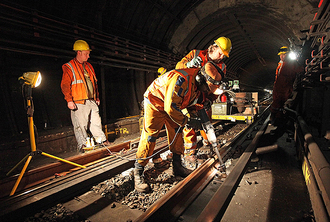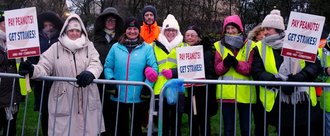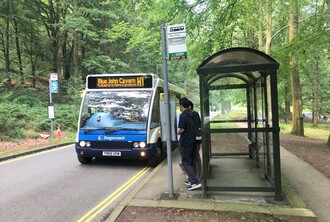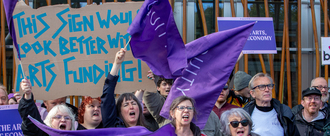-
Sick Pay for Catering staff at Sussex University!Chartwells staff at Sussex University are currently the ONLY workers on campus who have to operate on completely inadequate Statutory Sick Pay. This means when they're poorly, they are having to choose between staying home (and struggling to pay their bills) or coming to work when they're ill (in a food safe environment). *We demand Sick Pay that matches pay and is paid from the first day of illness! *They are NOT second class citizens! *This is NOT in line with the Sussex University values of Kindness, Integrity, Inclusion, Collaboration and Courage! Show your support448 of 500 SignaturesCreated by Kevin Reynolds
-
Save Byron Court Primary School - Stop the Forced Academisation🢜 Ensure an equal, non-selective environment with a focus on the whole child, an approach that doesn't achieve academic excellence or good behaviour by excluding children or making them scared to be in school 🢜 Give a say to those that it will impact most - the staff, the families, the local community 🢜 Stop the privatisation of our children's education HOW ELSE CAN YOU HELP? Write to your local councillors: https://bit.ly/BrentCounc Write to Barry Gardiner MP: [email protected] Follow us: https://twitter.com/savebyroncourt Instagram: https://www.instagram.com/savebyroncourt Facebook: https://www.facebook.com/savebyroncourt Donate to our Campaign fundraising page: https://gofund.me/c696a9202,206 of 3,000 SignaturesCreated by Save Byron Court

-
P&O Ferries' jobs massacre second anniversary: Never again!We must prevent a repeat of the P&O Ferries scandal. The Government has failed to introduce the reforms required to end the undercutting of other ferry operators on international short sea routes from UK ports which would prevent a repeat of this scandalous attack on UK seafarers and on the sovereignty of UK employment law.53,216 of 75,000 SignaturesCreated by Nautilus and RMT
-
National Museums Liverpool: Pay the £1,500 cost-of-living payment you owePCS members are having to take strike action to try and secure vital cost of living payments for all staff across National Museums Liverpool. Nobody wants to have to go on strike, but National Museums Liverpool (NML) are refusing to pay £1500 cost of living payment, and we are asking for your support and understanding that it is time to show the museums that it’s time they paid up! While museum bosses take home thousands of pounds a month, many of our lowest paid workers in this museum are choosing whether they should heat their homes or eat nutritious meals. That isn’t right. As people passionate about the culture, heritage, and story of this city and the fabulous collections we keep we deserve more than the basics for survival, we deserve to thrive, not merely survive. NML needs to find the money to pay its staff a fair wage, and to pay them the £1500 they are owed, and they deserve. Please show your support for the hard-working staff by writing to Sir David Henshaw, Chairman of the Board at National Museums Liverpool1,982 of 2,000 Signatures
-
Urgent support needed for sub-contracted track maintenance workers on the TubeLondon Underground employs hundreds of essential track workers on London’s iconic tube network through private contractors. These workers should be directly employed by London Underground, like other Tube maintenance workers, but instead London Underground has sub-contracted them through private companies who seek to make a profit from the contracts, meaning that the workers pay is kept low and they don’t get proper sick pay, pensions or holiday. Responding to a recent survey, 75% of these workers told RMT that they struggle to make ends meet, meaning that they sit by the phone waiting for work and feel obliged to accept any offers they get. The precariousness of their employment also means that they feel under pressure not to do anything that may jeopardise future work. Two thirds reported to us that they would be worried about reporting safety concerns for this reason. The private companies have made profits in excess of £30 million in the last five years. Now London Underground is re-tendering this work and will sign new contracts in March this year. RMT is concerned that it is looking to award to the cheapest bidder, which will lead to cuts in pay and hours for these workers. RMT is calling on the Mayor and the TfL Commissioner to bring these workers into direct employment with London Underground and, in the immediate term, confirm that there will be no detriment to staff and that all earnings and hours will be protected as part of the tendering. There must be no race to the bottom on the Tube.3,181 of 4,000 SignaturesCreated by RMT Union

-
Demand a pay rise for catering workers at Drax Power StationUnite members working in catering for BaxterStorey at Drax Power Station are taking strike action in their fight for a pay rise, and they need your support. These workers, 95% of whom are women, are struggling to make ends meet. They are single mothers and grandmothers who are having to car share to save on fuel costs, work second jobs to pay their bills, and one member whose husband passed away in December has been unable to afford to pay for a funeral. The total value of a 50p per hour increase for all workers in the catering team would be just £15,314– this is peanuts for a company like Drax Power Station. The latest accounts for both companies show that Drax made £731 million in profits while BaxterStorey made £25 million in profits. Drax’s CEO Will Gardiner saw his pay package increase by £2.2 million to £5.4 million per year. Despite burning money like it’s old-growth forest when it comes to pay for executives, Drax are refusing to negotiate on the hourly rate for the workers who feed their employees. Instead, Drax have engaged in union-busting behaviour by banning the workers' Unite official from site, and preventing meetings from taking place between the workers and their union official.5,341 of 6,000 SignaturesCreated by Chris Rawlinson
-
Save Hackney's Children's CentresHigh-quality, affordable childcare is critical to children’s development, especially the most vulnerable, and 0-3 years is where the biggest impact can be made on outcomes for children. Disadvantaged children benefit significantly from good quality preschool experiences, especially when they are educated with a mixture of children from different social and economic backgrounds - research has shown that this helps close the gap between them and their peers. This is particularly significant in Hackney, where there is a 43% child poverty rate, 10% higher than the London average. These cuts will hurt these children most and disadvantage minority groups. Closing these Children's Centre nurseries will result in the loss of 200 full-time, all-year, affordable childcare places to Hackney families. This is a 33% cut of subsidised nursery places in Hackney. The closures will disproportionately affect vulnerable children, lower-income families, women, single parents, and people of the Global Majority. Childcare costs are a driver of poverty and access to affordable childcare is essential for the wellbeing of working families. We want to protect the jobs of dedicated staff, many of whom also live in Hackney. We’re looking at over 40 staff (including support staff) over the two centres proposed for closure alone. Almost all staff are women and many are people of the Global Majority. We believe that more Children's Centre closures will follow as budgets are squeezed further and Hackney Council continue to make cuts to vital services. Children’s Centres provide vital support and services to local families and we must fight to keep them open! No Children’s Centre nursery closures! No cuts to affordable childcare!1,526 of 2,000 SignaturesCreated by Hackney UNISON branch

-
Save Our Schools - Stop the £8.2 million cut to Edinburgh SchoolsCutting £8.2m from schools will cause great harm to teaching, learning and wellbeing at a time when our teachers and support staff are, struggling to meet the needs of an ever growing number of pupils with Additional Support Needs, bearing the brunt on a daily basis of dysregulated pupil behaviour and suffering enormously from workload stress and low morale. Pupils that have an ASN need more to be invested in education, not less. But the same is also true of other pupils in their classes whose learning is also affected because teachers are so over-stretched as they struggle to attend to those with the greatest needs. Further cuts to Devolved School Management budgets will erode all kinds of provision. Some Head Teachers may be forced to cut numbers of Pupil Support Assistants, again affecting pupils who most need the support of these vital school workers. Others will cut per capita department budgets affecting which courses will be able to run or that basic essentials such as paper, pens, textbooks and vital resources will be increasingly unavailable. Schools cannot run on iPads alone. Already In some schools the amount of money available to spend per head is less than a pound a week and a great many teachers are buying pens, pencils and other resources for their pupils. The cost of these cuts to Edinburgh schools will be devastating, leading to increased stress and a decline in morale and wellbeing of teachers, support staff and senior leaders. Schools are constantly asked to look at how to raise attainment, how is it possible to do more with less.3,695 of 4,000 SignaturesCreated by Phill Pearce

-
SAY NO TO DERBYSHIRE SERVICE CUTS OF £32 MILLION!These services are not just numbers on a balance sheet; they are invaluable lifelines for our community. They provide essential support to our most vulnerable citizens, from children and the elderly to those with disabilities or facing financial hardship. The proposed cuts would have devastating consequences. According to the Office for National Statistics, local government spending on services has already fallen by over 20% in real terms between 2010-11 and 2020-21 (source: National Audit Office). Further reductions would push our public services beyond breaking point. We know that the Council are not investing in public services. They have increased the spending on private care home placements to £113 million - whilst nearly 50% of Derbyshire Council's OWN care home beds are empty! Moreover, bypassing the recognised trade unions (UNISON/ UNITE/ GMB) undermines the democratic process that should be at the heart of any changes in public service provision. The unions represent thousands of workers who dedicate their lives to serving our community - their voices must be heard. This is not just about preserving existing services; it's about protecting democracy, fairness, and social justice in Derbyshire. We must stand together against these short-sighted cuts that prioritise profit over people.2,547 of 3,000 SignaturesCreated by Dave Ratchford
-
Give Us Better Buses for England!Buses are the best used form of public transport and are vital for all ages. They enable people to lead fulfilling lives, connecting them with friends, family and the services they need. Unfortunately, due to austerity services have been severely degraded across England, with some places having no buses at all. Rising traffic has also taken its toll on services with buses caught in congestion, causing costs to rise. While the £2 bus fare cap has had a positive impact, some people can still find bus travel expensive. Information, bus shelters and ticketing are also all too often of poor quality and fragmented. This has led to many people being socially excluded with a lack of transport options. Others are being pushed into transport poverty. A radically different approach to bus services, acknowledging their wider benefits, including for the economy, would address these issues. They would create more inclusive, affordable and accessible (including for people with disabilities) services. They would help reduce motor traffic and pollution and help the UK meet its 2030 carbon target. So please consider adding your signature to the petition and help us get better bus services for everyone in England. This will give people better transport choices, reduce traffic and pollution and help us get to net-zero quickly enough.1,295 of 2,000 SignaturesCreated by Better Buses
-
BrewDog: Don't scrap the Living Wage!Stand with BrewDog bar workers and demand they are paid fairly.20,735 of 25,000 SignaturesCreated by Unite Hospitality

-
Stop Suffolk Council’s 100% Arts & Culture Funding CutsTHERE IS NO U-TURN! Suffolk Council's u-turn announcement is nothing of the sort. Long-term stable funding for the 9 arts organisations currently supported by the Council is still facing a 100% cut. The Council's new announcement is for a one off pot of funding open to anyone, forcing arts organisations to compete against each other, for a smaller cake cut into many slices and causing uncertainty. The Council has confirmed that once this one-off pot has run out, they will still not fund any arts budget. ===== Equity members, local residents, arts and cultural organisations across East Anglia have raised serious concerns following a proposed £528,000 cut to arts and culture funding by Suffolk County Council. The nine organisations affected cover the whole county and include: Suffolk Artlink, the Theatre Royal in Bury St Edmunds, the Food Museum in Stowmarket and The Long Shop Museum in Leiston, New Wolsey Theatre, DanceEast and Eastern Angles in Ipswich, Gainsborough’s House in Sudbury and FirstLight Festival in Lowestoft. While these cuts represent a tiny fraction of the council's need to save £64.7 million, they will have a disproportionate impact on Suffolk residents who rely on the arts and culture for employment and the wider community engaged with the vital support provided by these organisations across the county. Companies like Eastern Angles and New Wolsey Theatre tour schools and special educational needs settings providing performances and workshops for children. Suffolk Artlink delivers services to diverse communities including children at risk and vulnerable adults, contributing to Suffolk County Council's strategic priorities. The Food Museum in Stowmarket, which has a national reputation for its community work, but now faces a 13% cut to its core funding. Together these organisations provide hundreds of jobs, support the local economy and provide thousands of hours of engagement for children and adults who need it in Suffolk. They do not deserve to lose access to culture. Sign our petition to oppose these 100% cuts now.3,910 of 4,000 SignaturesCreated by Gareth Forest








.jpg)



